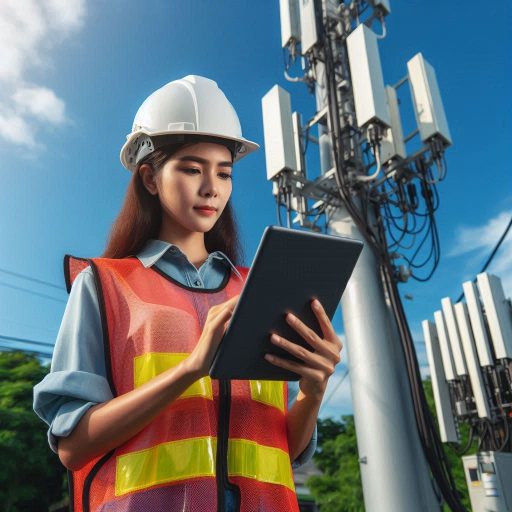Introduction
What a Telecommunications Technician is
A Telecommunications Technician is a professional responsible for installing, maintaining, and repairing communication systems.
These systems include telephone networks, cable television, internet connections, and wireless communications.
Technicians ensure that these systems function efficiently, providing uninterrupted service to users.
They work with both hardware and software components, setting up equipment, testing connections, and troubleshooting issues.
In the telecommunications industry, technicians play a crucial role in ensuring seamless communication across various platforms.
The role of a Telecommunications Technician in the industry
The role of a Telecommunications Technician is vital in maintaining the backbone of modern communication networks.
Technicians install and configure communication systems for homes, businesses, and public institutions.
They also perform regular maintenance to prevent outages and ensure high-quality service.
When problems arise, technicians diagnose and fix issues, restoring service quickly to minimize downtime.
With advancements in technology, their role has expanded to include working with sophisticated equipment and software, adapting to the ever-evolving landscape of telecommunications.
Impact of 5G technology on the role of Telecommunications Technicians
The advent of 5G technology has significantly impacted the role of Telecommunications Technicians.
5G offers faster speeds, lower latency, and the ability to connect more devices simultaneously.
These advancements require technicians to upgrade existing infrastructure and deploy new technologies.
The transition to 5G involves the installation of new equipment, such as small cell towers, and the optimization of networks for enhanced performance.
Telecommunications Technicians must now possess advanced skills to manage these complex systems, ensuring that the potential of 5G is fully realized.
The shift to 5G also demands continuous learning, as technicians must stay updated with the latest technologies and industry standards.
The impact of 5G extends beyond technical aspects, influencing how technicians interact with customers and manage service expectations.
As 5G becomes more widespread, the demand for skilled Telecommunications Technicians will increase, highlighting the importance of their role in the industry.
Overview of 5G Technology
What 5g Technology Is
- 5G technology is the fifth generation of wireless technology that promises faster speeds and lower latency.
- It aims to revolutionize the way we connect and communicate by offering higher data rates and improved reliability.
- Telecommunications technicians play a crucial role in implementing and maintaining 5G technology infrastructure.
Benefits and Advancements of 5G Technology
- 5G technology offers faster download and upload speeds, enabling seamless streaming and quicker downloads.
- It provides lower latency, reducing delays in data transmission, which is crucial for real-time applications.
- 5G networks can support a massive number of connected devices, making it ideal for the Internet of Things (IoT).
- Improved network reliability and coverage ensure a more stable connection, even in densely populated areas.
Potential Impact of 5G Technology on Telecommunications Technicians
- Telecommunications technicians will need to upgrade their skills to install and maintain 5G networks effectively.
- They will be responsible for troubleshooting and resolving issues related to 5G technology infrastructure.
- Telecommunications technicians will play a crucial role in ensuring the stability and efficiency of 5G networks.
- With the deployment of 5G technology, telecommunication technicians will have new career opportunities and challenges to explore.
Read: Surveying and Mapping Technician Internships: A Guide
Increased Demand for Telecommunications Technicians
The implementation of 5G technology has significantly increased the demand for skilled Telecommunications Technicians.
How the Implementation of 5G Technology Has Led to an Increased Demand for Skilled Telecommunications Technicians
The rollout of 5G technology has significantly boosted the demand for telecommunications technicians.
5G networks require more sophisticated infrastructure compared to previous generations.
Technicians must install, maintain, and troubleshoot new hardware and software components unique to 5G.
The complexity of 5G technology, with its high-speed data and low-latency features, necessitates specialized skills.
Additionally, the sheer volume of new base stations and small cells required for 5G deployment has created a surge in job opportunities.
Technicians are essential for ensuring these networks function efficiently and effectively.
As more industries adopt 5G, the need for skilled professionals in this field continues to rise.
Specific Skills and Knowledge Required
- Proficiency in understanding and working with 5G technology protocols and equipment
- Ability to troubleshoot and resolve issues related to 5G networks and infrastructure
- Knowledge of network configuration and optimization for efficient 5G performance
- Strong understanding of cybersecurity measures to protect 5G networks from potential threats
- Capability to work with specialized tools and software used in 5G telecommunications
Job Market Outlook for Telecommunications Technicians in the 5G Era
The job market for Telecommunications Technicians in the 5G era is projected to experience significant growth.
With the rapid expansion of 5G networks globally, there is a high demand for qualified technicians to install, maintain, and optimize these advanced telecommunications systems.
Telecommunications companies, network providers, and technology firms are actively seeking skilled professionals who can support the deployment and operation of 5G networks.
Telecommunications Technicians with expertise in 5G technology are expected to have abundant opportunities for career advancement and competitive salaries.
Employment prospects in the telecommunications sector are promising, particularly for individuals who possess the necessary skills and certifications related to 5G technology.
Read: How to Become a CAD Technician: Step-by-Step Guide
Training and Education for Telecommunications Technicians
The Specific Training and Education Requirements for Individuals Aspiring to Become Telecommunications Technicians in the 5G Era
Becoming a telecommunications technician in the 5G era demands rigorous training and education.
Candidates must possess a strong foundation in electronics, networking, and wireless communication systems.
Most employers require at least an associate degree in telecommunications, information technology, or a related field.
Programs should include coursework in digital communications, signal processing, and data transmission.
Practical experience is equally crucial, with hands-on training in installing, maintaining, and troubleshooting telecommunications systems.
As 5G technology advances, understanding cloud computing, network virtualization, and cybersecurity becomes essential.
Aspiring technicians must also develop proficiency in using advanced diagnostic tools and software, which are integral to managing complex 5G networks.
The Importance of Continuous Learning and Professional Development in This Field
Continuous learning and professional development are critical for telecommunications technicians in the rapidly evolving 5G landscape.
5G technology is dynamic, with frequent advancements in network architecture, protocols, and equipment.
Staying updated is not optional; it is a necessity for career growth and effective performance.
Technicians must regularly update their skills through workshops, seminars, and online courses.
Employers increasingly value technicians who demonstrate a commitment to learning and adapting to new technologies.
Professional development enhances problem-solving abilities, ensuring that technicians can handle complex challenges in real-time.
Moreover, staying informed about industry trends and innovations helps technicians remain competitive in the job market, offering greater job security and opportunities for advancement.
Specialized Certifications or Courses That May Be Beneficial for Telecommunications Technicians Working with 5G Technology
Specialized certifications and courses significantly boost a telecommunications technician’s expertise in 5G technology.
Industry-recognized certifications such as the Certified Wireless Network Professional (CWNP) or the 5G Core Network Specialist certification are particularly valuable.
These certifications validate a technician‘s knowledge of 5G network architecture, radio frequencies, and network management.
Additionally, courses in network security, cloud computing, and IoT integration provide essential skills for managing the complexities of 5G networks.
Some training programs also offer certifications in fiber optics and small cell technology, which are crucial components of 5G infrastructure.
Earning these certifications not only enhances a technician‘s technical skills but also demonstrates a commitment to excellence in the field.
This commitment is often rewarded with career advancement and higher earning potential.
Read: Top CAD Software for Aspiring CAD Technicians

Role and Responsibilities of Telecommunications Technicians in the 5G Era
Specific Tasks and Responsibilities
- Telecommunications Technicians are now expected to install and configure 5G network equipment efficiently.
- They must ensure proper network connectivity and performance for 5G services.
- Telecommunications Technicians are responsible for troubleshooting network issues and resolving them promptly.
- They need to conduct regular maintenance checks on 5G equipment to prevent any downtime.
- In the 5G era, Technicians must collaborate with other teams to optimize network performance.
- They are tasked with monitoring network performance metrics and making necessary adjustments when needed.
How Telecommunications Technicians are involved in the installation, maintenance, and troubleshooting of 5G networks
- Telecommunications Technicians play a crucial role in the installation of 5G base stations and antennas.
- They are responsible for integrating various network elements to ensure seamless 5G connectivity.
- Technicians conduct regular maintenance checks to ensure the reliability and efficiency of 5G networks.
- When troubleshooting network issues, they use specialized tools and equipment to diagnose problems accurately.
- Telecommunications Technicians work closely with network engineers to resolve complex network issues.
- They provide technical support to customers and ensure their 5G services are running smoothly.
New Challenges and Opportunities
- The implementation of 5G technology has brought new challenges for Telecommunications Technicians.
- They need to stay updated on the latest advancements in 5G technology to perform their tasks effectively.
- The increased complexity of 5G networks requires Technicians to enhance their troubleshooting skills.
- Telecommunications Technicians have the opportunity to specialize in specific areas of 5G technology.
- With the rise of Internet of Things (IoT) devices, Technicians can explore new avenues in 5G network management.
- Overall, the 5G era presents Telecommunications Technicians with both challenges and opportunities for professional growth.
Read: CAD Technician Salary: What to Expect in the USA
Impact on Network Security
Network security is critical in the 5G era to safeguard data and prevent cyber threats.
- Importance of Network Security: Protecting sensitive information and ensuring uninterrupted services are key priorities in the 5G landscape.
- Role of Telecommunications Technicians: They are instrumental in maintaining the security and integrity of 5G networks.
- New Security Protocols: Technicians must adhere to advanced encryption methods and robust authentication processes.
With the exponential increase in connected devices and the vast amounts of data transmitted over 5G networks, the need for enhanced security measures has never been greater.
Importance of Network Security in the 5G Era
Network security becomes even more critical with the advent of 5G technology.
The expansion of 5G networks introduces new vulnerabilities and complexities.
This technology supports faster speeds and higher data volumes but also expands the attack surface.
Cyber threats become more sophisticated and frequent, targeting both the network infrastructure and user data.
Ensuring robust security measures is essential to protect against potential breaches and attacks.
With 5G, there is a need for advanced security solutions to address emerging threats.
The increase in connected devices also amplifies the risk of cyber incidents.
Effective network security strategies must evolve to meet these new challenges and protect the integrity of the network.
How Telecommunications Technicians Play A Crucial Role In Ensuring The Security And Integrity Of 5g Networks
Telecommunications Technicians play a crucial role in ensuring the security and integrity of 5G networks.
They are responsible for implementing and maintaining security protocols, monitoring network traffic for suspicious activities, and responding swiftly to any security breaches.
Technicians must stay abreast of the latest cybersecurity threats and continuously update their skills to counter new vulnerabilities that may emerge in the rapidly evolving 5G landscape.
New Security Protocols and Practices
Working with 5G technology requires Telecommunications Technicians to adhere to new security protocols and practices to mitigate potential risks.
Transform Your Career Today
Unlock a personalized career strategy that drives real results. Get tailored advice and a roadmap designed just for you.
Start Now- Advanced Encryption: Implementing end-to-end encryption to secure data transmission and protect user privacy.
- Multi-Factor Authentication: Employing multi-factor authentication methods to enhance network access security.
- Security Automation: Leveraging automation tools to detect and respond to security threats in real-time.
As 5G networks become more pervasive, the role of Telecommunications Technicians in ensuring network security becomes increasingly vital.
Their expertise in implementing stringent security measures and promptly addressing security incidents will be crucial in maintaining the trust and reliability of 5G networks.
Delve into the Subject: Impact of Agricultural Engineers on Food Production
Collaboration with Other Professionals
Importance of Collaboration Between Telecommunications Technicians and Other Professionals in the Field
Collaboration among telecommunications technicians and other professionals is essential in the evolving 5G landscape.
As the complexity of telecommunications networks grows, so does the need for diverse expertise.
Telecommunications technicians rely on their skills to install and maintain equipment, but they cannot work in isolation.
They must collaborate with engineers, network architects, and IT specialists to ensure the successful deployment and operation of 5G networks.
This collaboration is not just beneficial; it is crucial.
It ensures that all aspects of the 5G infrastructure function harmoniously, leading to a robust and reliable network.
The synergy between different professionals allows for the quick identification and resolution of issues, minimizing downtime and enhancing network performance.
Without collaboration, the risk of errors and inefficiencies in the network increases, which can negatively impact service delivery.
How Telecommunications Technicians Work Alongside Engineers, Network Architects, and IT Specialists to Implement and Maintain 5G Networks
Telecommunications technicians play a vital role in the implementation and maintenance of 5G networks, but they do not work alone.
They collaborate closely with engineers, network architects, and IT specialists to achieve common goals.
Engineers design the technical specifications of the 5G infrastructure, determining the necessary equipment and software.
Network architects create the overarching network design, ensuring that the infrastructure supports the required performance levels.
IT specialists manage the integration of various systems and ensure cybersecurity measures are in place.
Telecommunications technicians take these designs and bring them to life, installing and configuring the equipment according to precise specifications.
Once the network is operational, technicians work alongside IT specialists to monitor performance, troubleshoot issues, and perform routine maintenance.
This multidisciplinary approach ensures that the 5G network is not only well-constructed but also secure and efficient.
The Benefits of Interdisciplinary Collaboration in Ensuring the Success of 5G Technology Implementation
Interdisciplinary collaboration brings numerous benefits to the implementation of 5G technology.
When telecommunications technicians, engineers, network architects, and IT specialists work together, they combine their expertise to solve complex challenges.
This collaboration leads to more innovative solutions, as professionals from different disciplines bring unique perspectives and skills to the table.
For instance, engineers might identify potential technical issues, while IT specialists ensure that these solutions do not compromise cybersecurity.
Network architects ensure that the network design is scalable and future-proof, allowing for seamless upgrades.
Telecommunications technicians ensure that the network is implemented correctly and maintained effectively.
This collaborative effort results in a more reliable, secure, and efficient 5G network.
Additionally, interdisciplinary collaboration fosters knowledge sharing, which enhances the skills and expertise of all professionals involved.
This continuous learning process ensures that the workforce remains adaptable and capable of addressing new challenges as they arise, contributing to the overall success of 5G technology implementation.
Conclusion
Impact of 5G Technology on the Role of Telecommunications Technicians
5G technology has profoundly transformed the role of Telecommunications Technicians.
The introduction of this next-generation network brings enhanced speeds, lower latency, and greater connectivity.
Technicians must now manage more complex equipment and infrastructure.
They are required to install and maintain advanced 5G antennas and small cells, which are crucial for delivering high-speed connectivity.
The deployment of these technologies demands a deeper understanding of new network protocols and frequencies.
Technicians must also address issues related to network density and interference, which are more prevalent in 5G environments.
This evolution in technology necessitates that technicians continually update their skills and knowledge.
The Importance of Adapting to New Technologies and Staying Current with Industry Trends
Adapting to new technologies is essential for Telecommunications Technicians to remain relevant in the industry.
The rapid advancement of technology means that staying current is not just an option but a necessity.
Embracing ongoing education and training helps technicians keep pace with innovations in network technology and equipment.
This proactive approach allows them to handle new challenges effectively and implement solutions efficiently.
By staying updated with industry trends, technicians can enhance their problem-solving skills and maintain high standards of service.
The ability to quickly adapt to new systems and processes is crucial for success in the evolving field of telecommunications.
Aspiring and Current Telecommunications Technicians to Consider the Opportunities and Challenges Presented by the 5G Era
The 5G era offers numerous opportunities and challenges for aspiring and current Telecommunications Technicians.
For those entering the field, it presents a chance to be at the forefront of technological advancement.
Technicians can specialize in 5G networks and become experts in this cutting-edge technology.
However, this comes with the challenge of mastering new skills and adapting to a rapidly changing environment.
Technicians must be prepared to tackle the complexities of 5G infrastructure and stay informed about emerging trends.
Embracing these challenges can lead to rewarding career advancements and positions of leadership within the industry.
The 5G era promises a dynamic and exciting future for those willing to engage with its opportunities.
[E-Books for Sale]
The Big Book of 500 High-Paying Jobs in America: Unlock Your Earning Potential
$19.99 • 500 High-Paying Jobs • 330 pages
Explore 500 high-paying jobs in America and learn how to boost your career, earn more, and achieve success!
See All 500 High-Paying Jobs of this E-Book
1001 Professions Without a Degree: High-Paying American Jobs You Can Start Now
$19.99 • 1001 Professions Without a Degree • 174 pages
Discover 1001 high-paying jobs without a degree! Unlock career tips, skills, and success strategies for just $19.99!




